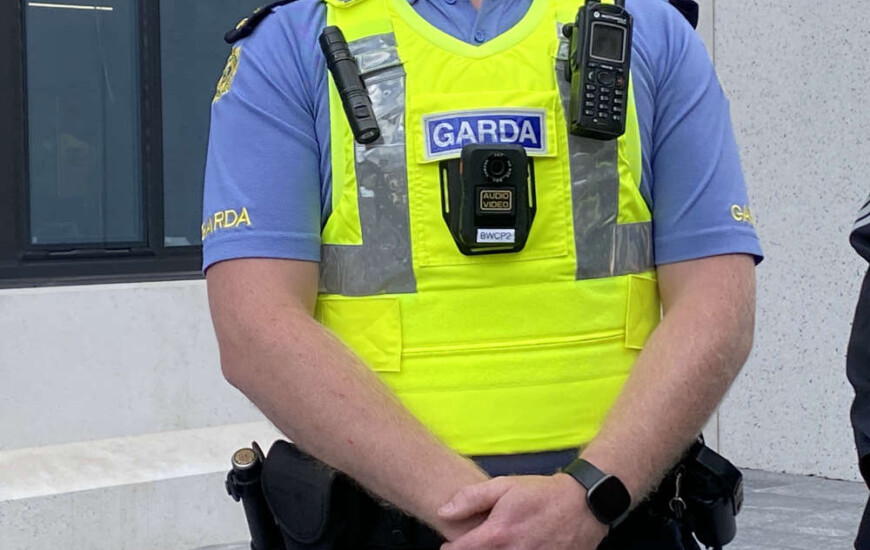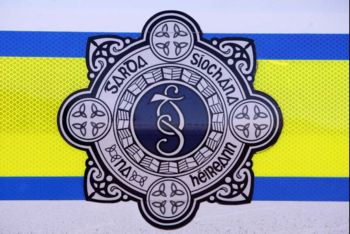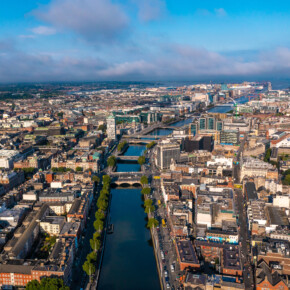Store Street Gardaí to use body cameras
Mike Finnerty 06 Jun 2024
Gardaí on Store Street will be among the first in the country to use bodyworn cameras.
South of the Liffey, Gardaí at the Pearse and Kevin Street stations will be using the technology.
The legislation was drafted up in the aftermath of last November’s riots, with Minister for Justice Helen McEntee saying the technology was a crucial part in modernising the Gardaí.
The rollout of the technology has been welcomed by Taoiseach Simon Harris, saying that the cameras are “vital to protecting gardaí on the beat as they experience an increase of attacks which will not be tolerated.”
He said that “too often, Gardaí find themselves in situations where they are being recorded in tense situations with footage often edited to suit a particular narrative.”
Minister McEntee said the rollout of the technology was a priority for her.
“The Introduction of body-worn cameras is part of my plan to ensure that An Garda Síochána is a modern police service fit for the digital age. This technology will be invaluable to the 350 Gardaí who will use it across three Dublin city centre Garda stations.”
She says she hopes to eventually roll the technology out nationwide, and says that Ireland is merely following in the path of other nations that have granted their police forces body-worn cameras.
“We cannot keep sending Gardaí into situations where they are the only ones without the ability to record what is happening,” she said.
Speaking after last November’s riots, McEntee said the violence that took place underpinned how “crucial” bodycams and facial recognition technology are when it comes to combatting crime.
Garda Commissioner Drew Harris claimed that international experience has shown that body-worn cameras will increase safety for Gardaí and the public.
He said that the technology will serve as an “important evidentiary tool.”
A statement from the Department of Justice has explained in detail that there are strict conditions surrounding the usage of the technology.
All footage from the cameras will be stored in a central database, named DEMS.
DEMS will also serve as a platform for Gardaí to examine footage gathered by CCTV.
Gardaí will be encouraged – but not obliged – to follow a code of best practice while using the cameras along with the existing Garda code of ethics.
The cameras will be placed on the garda’s chest and will flash red when they are on.
Each bodyworn camera can record footage to its own internal encrypted storage, which will be uploaded when the Garda docks the camera in a Garda station.
Body-worn camera footage is uploaded at the end of a shift so it can be used as evidence at court or is then subsequently deleted after an agreed time period if it’s not required as evidence.
The Irish Times additionally reported that Gardaí are not legally obliged to tell members of the public that they are being recorded when they are in a public space, but must do so when they are in a private setting (unless it is unsafe to do so).
Despite these provisions, there have been concerns over the technology being used by the Gardaí.
When the bill was debated before the Oireachtas Committee on Justice last year, the committee heard that the technology carried an inherent risk of gender and racial biases.
Irish Council for Civil Liberties (ICCL) executive director Liam Herrick told Newstalk that he still had concerns over the technology.
He said that he was “sceptical” that the technology would be useful, saying “the jury is out” with regards to the technology being used in the United States.
“If they (body cameras) did what they promised to do I think everybody would be in favour of them,” he said.
“If they don’t deliver those results, then they don’t justify the cost and the risk to privacy and other rights.”
He noted that the government has also shifted from a proof of concept to an outright pilot program.
Aside from Dublin, stations in Waterford and Limerick will also take part in the scheme.
Herrick said there was some ambiguity as to how the Gardaí measured the success of the project and was too subjective.
Green Party TD Patrick Costello was quoted as saying in the Dáil in early 2023 that he had “grave concerns” over the technology.
“Any time we give new powers to the Garda, we must be sensitive, have a debate and ensure there are checks and balances so that the powers we give strike the right balance between the right of the community at large to be safe and the rights of the individual citizen.”
“If we are introducing facial recognition technology with the hope of streamlining Garda work and making it easier for gardaí to catch and prosecute criminals, then swamping them with a load of false negatives of innocent people who have been caught up in the dragnet of facial recognition technology or mass surveillance will just overwhelm our already overburdened courts and our already overburdened Gardaí.”
“The question must be asked whether the introduction of facial recognition technology would be in line with the fundamental freedoms of the EU citizens that the European Union promises,” he said at the time.











